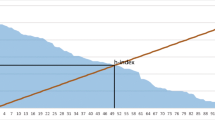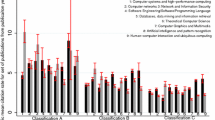Abstract
Given the current availability of different bibliometric indicators and of production and citation data sources, the following two questions immediately arise: do the indicators’ scores differ when computed on different data sources? More importantly, do the indicator-based rankings significantly change when computed on different data sources? We provide a case study for computer science scholars and journals evaluated on Web of Science and Google Scholar databases. The study concludes that Google scholar computes significantly higher indicators’ scores than Web of Science. Nevertheless, citation-based rankings of both scholars and journals do not significantly change when compiled on the two data sources, while rankings based on the h index show a moderate degree of variation.





Similar content being viewed by others
References
Anderson, T. R., Hankin, R. K. S., & Killworth, P. D. (2008). Beyond the Durfee square: Enhancing the h-index to score total publication output. Scientometrics, 76(3), 577–588.
Bakkalbasi, N., Bauer, K., Glover, J., & Wang, L. (2006). Three options for citation tracking: Google Scholar, Scopus and Web of Science. Biomedical Digital Libraries, 7. Retrieved December 20, 2008, from http://www.pubmedcentral.nih.gov/articlerender.fcgi?artid=1533854.
Bar-Ilan, J. (2008). Which h-index? A comparison of WoS, Scopus and Google Scholar. Scientometrics, 74(2), 257–271.
Bar-Ilan, J., Levene, M., & Lin, A. (2007). Some measures for comparing citation databases. Journal of Informetrics, 1(1), 26–34.
Batista, P. D., Campiteli, M. G., & Konouchi, O. (2006). Is it possible to compare researchers with different scientific interests? Scientometrics, 68(1), 179–189.
Bauer, K. & Bakkalbasi, N. (2005). An examination of citation counts in a new scholarly communication environment. D-Lib Magazine, 11(9). Retrieved December 20, 2008, from http://www.dlib.org/dlib/september05/bauer/09bauer.html.
Bollen, J., Rodriguez, M. A., & de Sompel, H. V. (2006). Journal status. Scientometrics, 69(3), 669–687.
Bornmann, L., & Daniel, H.-D. (2007). What do we know about the h index? Journal of the American Society for Information Science and Technology, 58(9), 1381–1385.
Bornmann, L., Marx, W., Schier, H., Rahm, E., Thor, A., & Daniel, H.-D. (2009). Convergent validity of bibliometric Google Scholar data in the field of chemistry citation counts for papers that were accepted by Angewandte Chemie International Edition or rejected but published elsewhere, using Google Scholar, Science Citation Index, Scopus, and Chemical Abstracts. Journal of Informetrics, 3(1), 27–35.
Braun, T., Glänzel, W., & Schubert, A. (2006). A Hirsch-type index for journals. Scientometrics, 69(1), 169–173.
Brin, S., & Page, L. (1998). The anatomy of a large-scale hypertextual web search engine. Computer networks and ISDN systems, 30(1–7), 107–117.
Choppy, C., van Leeuwen, J., Meyer, B., & Staunstrup, J. (2009). Research evaluation for computer science. Communications of the ACM, 54(4), 31–34.
Computing Research Association (1999). Best practices memo—evaluating computer scientists and engineers for promotion and tenure. Computing Research News. Retrieved December 20, 2008, from http://www.cra.org/reports/tenure_review.html.
Egghe, L. (2006). Theory and practice of the g-index. Scientometrics, 69(1), 131–152.
Garfield, E. (1979). Citation indexing: Its history and applications in science, technology and humanities. New York: Wiley.
Goodrum, A. A., McCain, K. W., Lawrence, S., & Giles, C. L. (2001). Scholarly publishing in the internet age: A citation analysis of computer science literature. Information Processing & Management, 37(5), 661–675.
Harold, E. R. & Means, W. S. (2004). XML in a nutshell (3rd ed.). Sebastopol: O’Reilly.
Hirsch, J. E. (2005). An index to quantify an individual’s scientific research output. Proceedings of the National Academy of Science of the United States of America, 102(46):16569–16572.
Jacsò, P. (2005). As we may search. Comparison of major features of the Web of Science, Scopus, and Google Scholar citation-based and citation-enhanced databases. Current Science, 89(9):1537–1547. Retrieved December 20, 2008, from http://www.ias.ac.in/currsci/nov102005/1537.pdf.
Katsaros, C., Manolopoulos, Y., and Sidiropoulos, A. (2006). Generalized h-index for disclosing latent facts in citation networks. Retrieved December 20, 2008, from http://arxiv.org/abs/cs.DL/0607066.
Kousha, K., & Thelwall, M. (2007). Google scholar citations and Google Web/URL citations: A multi-discipline exploratory analysis. Journal of the American Society for Information Science and Technology, 58(7), 1055–1065.
Kousha, K., & Thelwall, M. (2008). Sources of Google Scholar citations outside the Science Citation Index: A comparison between four science disciplines. Scientometrics, 74(2), 273–294.
Meho, L. I., & Rogers, Y. (2008). Citation counting, citation ranking, and h-index of human-computer interaction researchers: A comparison between Scopus and Web of Science. Journal of the American Society for Information Science and Technology, 59(11), 1711–1726.
Meho, L. I., & Yang, K. (2007). Impact of data sources on citation counts and rankings of LIS faculty: Web of Science vs Scopus and Google Scholar. Journal of the American Society for Information Science and Technology, 58(13), 2105–2125.
Moore, D. (2006). Basic practice of statistics (4th ed.). New York: WH Freeman Company.
Norris, M., & Oppenheim, C. (2007). Comparing alternatives to the Web of Science for coverage of the social sciences literature. Journal of Informetrics, 1(2), 161–169.
Noruzi, A. (2005). Google Scholar: The new generation of citation indexes. Libri, 55(4), 170–180.
Pauly, D. & Stergiou, K. I. (2005). Equivalence of results from two citation analyses: Thomson ISI citation index and Google scholar service. Ethics in Science and Environmental Politics, 33–35.
Saad, G. (2006). Exploring the h-index at the author and journal levels using bibliometric data of productive consumer scholars and business-related journals respectively. Scientometrics, 69(1), 117–120.
Sanderson, M. (2008). Revisiting h measured on UK LIS academics. Journal of the American Society for Information Science and Technology, 59(7), 1184–1190.
Shaw, D., & Vaughan, L. (2008). A new look at evidence of scholarly citation in citation indexes and from web sources. Scientometrics, 74(2), 317–330.
R Development Core Team (2009). R: A Language and Environment for Statistical Computing. R Foundation for Statistical Computing, Vienna, Austria. ISBN 3-900051-07-0.
Weingart, P. (2005). Impact of bibliometrics upon the science system: Inadvertent consequences? Scientometrics, 62(1), 117–131.
Whitley, K. M. (2002). Analysis of SciFinder Scholar and Web of Science citation searches. Journal of the American Society for Information Science and Technology, 53(14), 1210–1215.
Zhao, D. Z., & Logan, E. (2002). Citation analysis using scientific publications on the web as data source: A case study in the XML research area. Scientometrics, 54(3), 449–472.
Author information
Authors and Affiliations
Corresponding author
Rights and permissions
About this article
Cite this article
Franceschet, M. A comparison of bibliometric indicators for computer science scholars and journals on Web of Science and Google Scholar. Scientometrics 83, 243–258 (2010). https://doi.org/10.1007/s11192-009-0021-2
Received:
Accepted:
Published:
Issue Date:
DOI: https://doi.org/10.1007/s11192-009-0021-2




